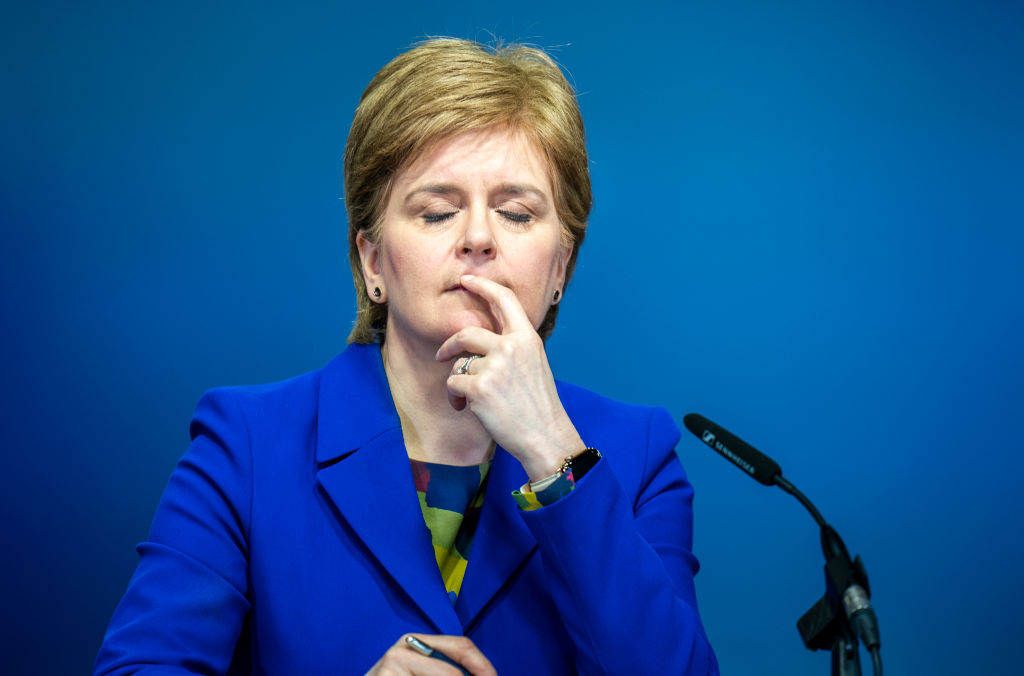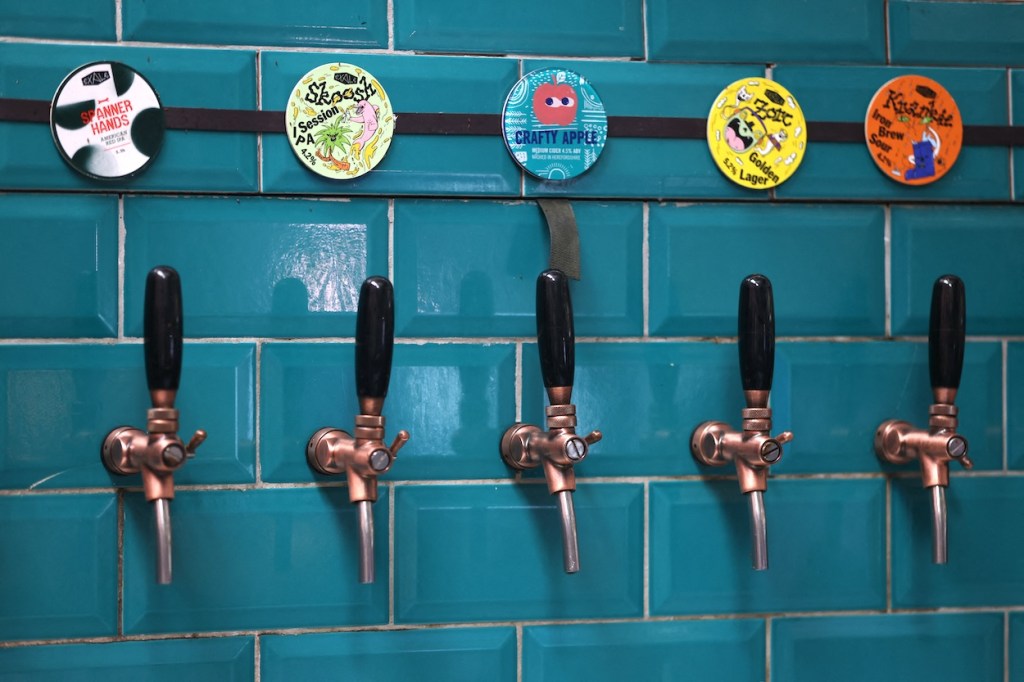Nicola Sturgeon isn’t someone for whom oversharing comes naturally. Throughout her career, she has regularly been labelled ‘dour’ or ‘frosty’ by both her opponents and those on her own side. As her profile grew through the 2010s, so did her popularity among the SNP’s expanding membership – and in her first week of being party leader she mustered a 12,000-strong crowd with which to celebrate in Glasgow’s Hydro. But she remained an introvert with a tight-knit circle of few friends. ‘I can come alive on a stage in front of thousands of people, but put me at a dinner table with four people and I will struggle much, much more,’ she told the Sunday Times. While so much has been written about Scotland’s former first minister, there don’t seem to be many people who really know her. It’s unclear, also, whether she knows herself.
Sturgeon’s new memoir Frankly (which is out today) and the interviews that have accompanied it seem like an attempt to shrug off that reservedness. The events of the last two years – Sturgeon’s gender bill; her impromptu resignation; the Operation Branchform police probe into SNP finances – have been dissected, judged and criticised relentlessly. Now Scotland’s former leader is giving people the opportunity to see things from her point of view. Her critics say she is less offering insight, more rewriting history.
Sturgeon’s interview with ITV’s Julie Etchingham sees elements of both. One of the controversies that, some suggest, prompted her resignation in February 2023 was the Gender Recognition Reform Bill – and the case of Isla Bryson. Sturgeon still struggles to call the sexual offender a man and pointedly sticks to ‘they/them’ pronouns. While she admits that she ‘lost the dressing room’ on the gender debate, calling it ‘her failure’, the former FM appears to regret her communication, rather than the substance of her argument. The closest Sturgeon gets to admitting she might have been wrong on the best way to protect trans people is when she says: ‘We lost all sense of rationality in this debate. I am partly responsible for that… I should have said, okay, let’s pause. Let’s take a step back.’
It is clear Sturgeon doesn’t know how to square this particular circle – but that there is a vocal group of people she is conscious of upsetting. She hints at this briefly: ‘Anything I say about Isla Bryson, in the wider world, will be immediately taken and transferred to every trans person. And if I sometimes still seem as if I’m struggling with how to define Isla Bryson, it’s not out of any concern for Bryson, it’s out of concern for how that then affects the wider trans community.’
There are three moments when glimpses of real, unfiltered emotion are seen in the ITV interview. When the police arrived at her door with a search warrant over an embezzlement investigation, the former first minister left for her parents’ house. She sounds unnerved as she tries to describe the day, saying she can’t remember much except shock at photos that made her home look ‘like a murder scene’. She describes her own arrest some months later as the worst day of her life. ‘Do you stand by that you knew nothing?’ Etchingham asks. ‘If there had been any evidence that I had done anything that constituted a criminal offence, I wouldn’t be sitting here right now having been cleared by the police,’ Sturgeon replies, in a way that doesn’t quite answer the question.
Covid is an emotive issue for the woman who led Scotland through the pandemic. Sturgeon’s daily press conferences and decision making saw her popularity – and that of independence – soar at the time, though she was later accused of having pursued her own public health strategy for political gain. With Etchingham, she discusses how she started going to therapy a few weeks after the Covid inquiry. Yet talking about how she felt when she sought help proves difficult for a woman who has over the last decade demonstrated an otherwise uncanny ability to hold herself together. Sturgeon admits she didn’t tell her mum that she had gone to counselling – and makes a mental note on screen to explain this to her ‘before she gets to this bit in the book’.
Sturgeon has been a politician for so long that she doesn’t know who she is outside of that
And it was talk about Salmond’s death that prompted something of another visceral reaction from his onetime protégée. The Salmond-Sturgeon fallout tore apart the ‘Yes’ movement, leaving a pair that had hoped to secure independence together at each other’s throats. To ITV, Sturgeon says: ‘Do I believe he behaved inappropriately – that’s different to criminally inappropriately – on some occasions towards women? I believe that, and… instead of acknowledging that and showing contrition and apologising for that, he doubled down.’
His death conjures up strange feelings. ‘He died, and I hadn’t spoken to him for years,’ Sturgeon admits. ‘I went through this period of I would still talk to him in my head. I would have vivid dreams that we were still on good terms. And then I’d have this feeling of such sadness when I remembered the reality, so I went through that process. I still missed him in some bizarre way. Even today, I still miss him in some way. The person that I used to know in the relationship I used to have.’
Elsewhere, Sturgeon keeps her answers superficial. On preparing for the 2014 indyref, she said that while the SNP had been ‘caught a bit off guard’ and lacked positions that would ‘withstand the full glare of scrutiny’, the party turned things around with their white paper (which, she claims, Salmond never read). On issues of governance, she switches back into politician mode, shrugging: ‘Do I wish I had done more? Of course I do.’ An expression of distaste flickers across her face at the mention of the Reform surge in Scotland and on Nigel Farage she is scathing about his ‘fragile ego’ and ‘bravado’.
The interview swings between political events and personal travesties, with talk of her miscarriage a tender point. She’s candid: ‘I carry a sense of guilt that I miscarried a baby, because I had been conflicted about the pregnancy.’ She jokes later, on a more light-hearted note, that getting a tattoo at 55 is a ‘mid-life crisis alert’. Its infinity-arrow design, she divulges, symbolises strength, resilience and her continuing to move forward.
Nicola Sturgeon has been a politician for so much of her life that you get the sense she doesn’t know who she is outside of that. Her detractors will dismiss her memoir and these interviews as a blatant attempt to reshape a narrative that slipped out of her control in recent years. But it feels much less contrived than that. The former first minister has chosen to expose herself while still in a period of transition. ‘I do feel a sense of liberation,’ she smiles a little uncertainly at Etchingham as the interview wraps up. But she still seems lost, too.








Comments